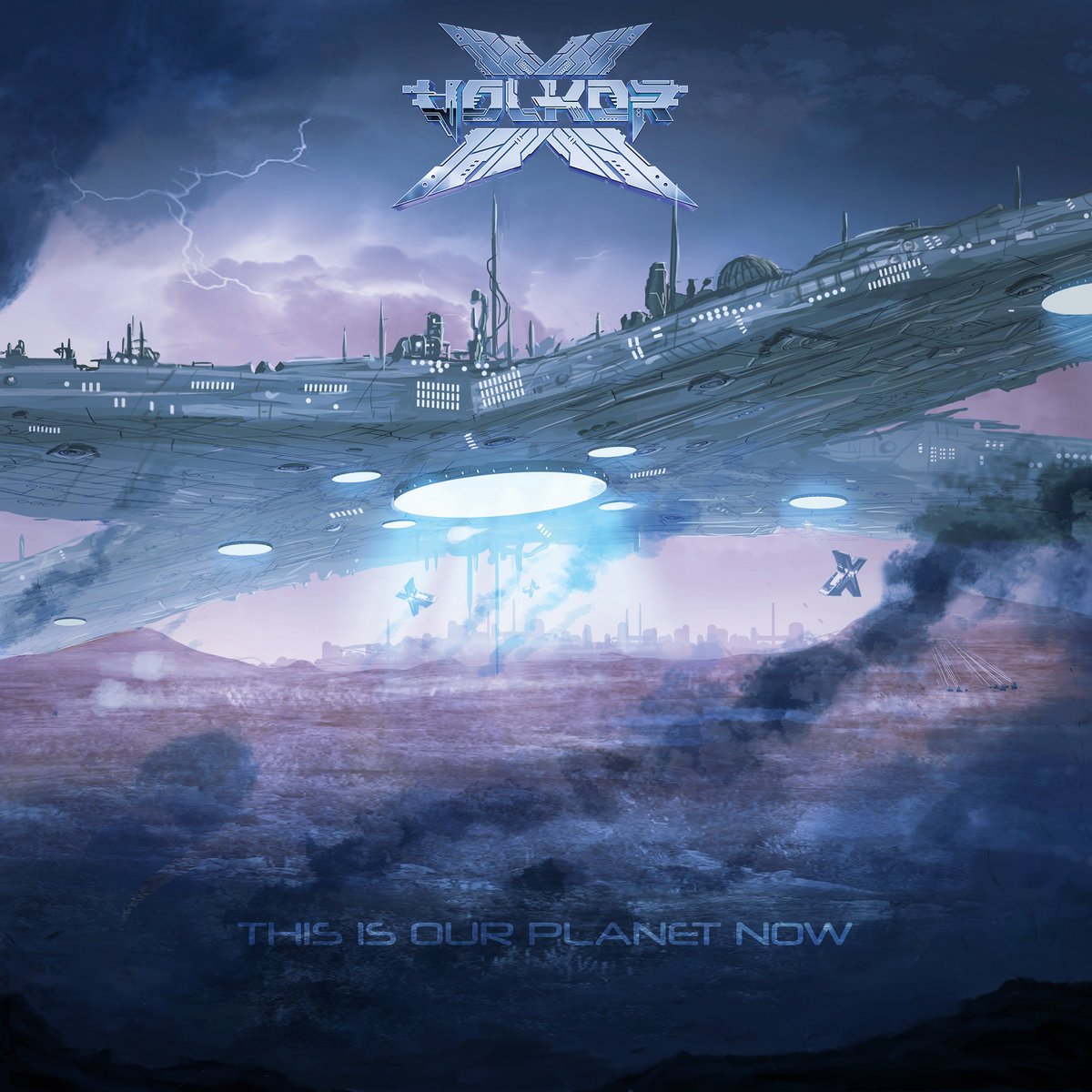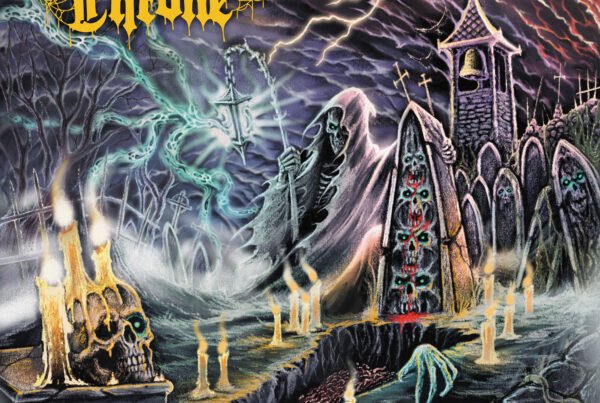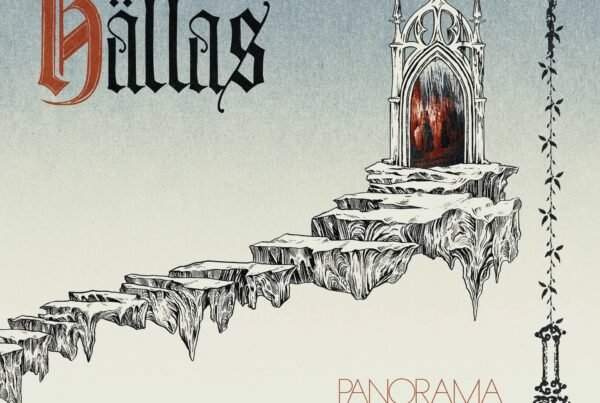You ever just… forget to do something? That’s kind of what Missed Connections is for. If you’re not familiar with this feature, it runs at the end of the year and offers us a chance to talk about an album we missed out on covering from earlier in the year. It’s also getting increasingly ridiculous subtitles and I intend to keep that tradition going. What will next year’s be? No idea.
This is the first part of a planned three-part series with future parts coming out on subsequent Tuesdays. Today, we focus on dense post-metal, extraterrestrial synthwave, and emotional post-hardcore. If you want more information on the bands covered, click their names in the header to see their Facebooks, and click the titles of the albums to stream the whole thing.
I appreciate you!
Eeli
B R I Q U E V I L L E are a band of a thousand mysteries. The elusive characters behind the moniker perform and even practice together wearing masks and gowns, give interviews and shed any other kind of light to their output extremely rarely, and, imaginatively put, seem to exist somewhere in the middle of dream and reality. That may come across as a bit of a hazy hyperbole, but you’ll detect these aspects yourself right away when you dig into their mien. I realize that to some, B R I Q U E V I L L E’s essence is inaccessible, and I also understand how this rather ’artsy’ secrecy can be distancing and a target of ridicule for some. But as far as I’m concerned, the band themselves hit the nail on the head by stating that they aim to get rid of the cult of personality, and its related connotations. After all, it’s the music that matters, and aesthetic tends to be the second most important aspect, with the members’ identities being quite far down that particular checklist.
I first discovered B R I Q U E V I L L E soon after the release of their sophomore album, plainly titled II, which came out through Pelagic Records in 2017. The three massive tracks didn’t capture me right away, but I noticed I returned to it over and over again. So the appeal was significant right from the start, even if it took a while to really grasp the band’s sonic depth and appearance. Tailing that, the interest to hear what happens next really skyrocketed after the band announced their third album Quelle to be released this past October, and this excitement was met with an earth-shattering and mind-boggling artistry and execution. Upon the release, I was way too invested in matters not even remotely related to writing, and even though it throbbed in the back of my head for weeks, I sadly just didn’t have the time to properly dig into the album by means of reviewing it. But, luckily I got another chance to do just that, enabled by this special feature you’re reading right now.
On Quelle, B R I Q U E V I L L E manages to soar higher, and simultaneously delve deeper, than ever before. The eight tracks are an intense and tense journey deep into the band’s internal and therefore hidden narrative – that’s a lot to take in, let alone to properly comprehend. While on the previous records, the listener has been mainly following the mentioned monologue that seemingly existed only on its own observable realm, this time the listener is let in and led through the nooks and crannies of this hauntingly beautiful, but effusively dismal place to witness the formerly unknown and well-obscured perspectives the band has to offer, and the stories they have to tell. And what’s perhaps the most notable feature to this, is that B R I Q U E V I L L E does all this and more while being completely instrumental, apart from some eerie, mangled, and modified chants here and there.
I’ve said countless times that it appears that post-metal is doing better than ever during this year. While it itself is a difficult category, as it only offers some certain frameworks to what you may expect, the atmosphere and dynamics are the few consistent things dictating that genre quite steadily. On Quelle, the tone and mood heavily rely on the ominous and abrasive end of the scope, which makes it stand out for its own benefit. We still get tracks like ”Akte X” that are drenched in melancholy, progressing in almost a proggy pace, but still holding on to the band’s signature sound, whereas tracks such as ”Akte VIII” and ”Akte XIV” demonstrate this more disorienting and sinister style that carries most of the songs and determines B R I Q U E V I L L E’s unique aural elegance. ’Akte’, by the way, directly translates to ’deed’ from Dutch, and without the explicit context that vocals and lyrics offer, we can only guess what these chronologically rising titles depict. But what’s for sure, is that they don’t refer to anything jolly or pleasant.
The brilliance of Quelle, however, lies in its captivating grip and constantly evolving, molding structures that are perhaps of the most impactful kind this particular genre has seen in a longer while. The balance between loud and quiet is nothing short of being perfect, and even though the dynamics shift a lot and the tone stays cohesive throughout, not once does B R I Q U E V I L L E even slightly tread on monotony or repetition. The album’s inner journey is a massive one to deal with, but it will pay off in the end in a grandiose and delightful manner, no matter how heart-wrenching it can be.
Robert
I just love the fact that we get to have Missed Connections. It’s especially great if any of us missed something either noteworthy or something that is just simply great on a personal level. I feel that the album I’m going to be rambling about belongs to both cases in certain ways.
Roughly several weeks ago I just happened upon this record, while scrolling idly through my news feed. The cover art was pretty dope and I think it was actually the full album stream from WherePostRockDwells. I figured that I should give this a go since it looks kind of promising. I honestly can’t believe I missed out on this for so long. With every re-listen, it only cemented itself further on my album of the year list.
I was about ten minutes into the album when it had already firmly tangled its roots around me. I’ve honestly never heard anything like this before. As the album came to its end, I quickly put it from the start and I probably listened to it at least twenty-something times by the moment I’m writing this. It’s basically an amalgamation of synthwave, post-rock, and a dash of metal. It also has a very subtle pinch of what I’d call a progressive feeling. I can’t say it’s a progressive album, but it sort of alludes to that whole area somehow. I really can’t put my finger on it properly. If I were to try and pin it down to something concrete though, I’d say it’s the multitude of layers that are interwoven throughout.
This is our Planet now is neither long nor short. It comes in at the somewhat standard length of roughly forty-five minutes, distributed across seven tracks. It’s packed neatly in a tight and lean fashion. It also doesn’t have any kind of dips in consistency or quality. It’s a fairly straightforward record without any tricks up its sleeve or any wild surprises. By the time the second track finishes, you pretty much know what you’re in for until the end. Normally I would be bothered by such predictability, yet, oddly enough, I don’t care for it in this case.
While the foundation of the record is firmly established in a synthwave frame of reference, the tunes take on the layered and texture oriented delivery that is usually found in post-rock. They also pack a proper kick due to the shred of metal that is peppered through the songs. The mood of the album has something of a retro sci-fi vibe that alludes to stuff going on in space. This offsets the usual penchant for the atmosphere that is usually found in synthwave, which hearkens to old video games. All these things when blended together offer an experience unlike any other within this niche.
This is our Planet now starts by going straight into the action, without any hesitation. “Stratos” eases us in with steady pulses and a brief but compelling guitar solo. As “Stratos” sets up the whole scenery and the mood of the record, we are thrown into the core of it immediately after. “Beam” is quite easily the highlight of all the action. It’s an epic stretching nearly eight and a half minutes. It carries with it this crescendo/climax build-up which is stretched across the whole song. Across its length, it explores a variety of textures which hearken to brooding imagery of deep space. It’s truly an amazing ride.
While “Crimson Clouds” and “Shoot Them Up” return to the set mold by the opener, they both retain some of the deep character of “Beam” and take time to explore the more spacey side of things. Surely “Crimson Clouds” aims for a more laid-back delivery and colorful display of it, whereas “Shoot Them Up” goes for a more high octane approach. “Gravity” comes up next with a stronger resemblance to “Beam”, in the sense that it also emphasizes on a delivery that looks deeper into atmosphere than in overall structure.
“Atomic Dust” makes a strong mark as the longest of the songs – one of the most tense and charged as well. This or “Beam” would have made perfect album closers, however it seems that instead we got the title track. “This is our Planet now” doesn’t really feel like an appropriate ending for the record, but I’ll take it due to all the awesome content which came before. It’s also a solid song in itself so there are really no complaints over that.
I think this pretty much sums it up as far as I’m concerned. I’m happy that I got to discover this record as it is and if you feel like you resonate with what I said, go and listen to This is our Planet now right away. Just keep in mind that compared to Volkor X’s previous records, it’s quite different. It seems to be quite a leap in a different direction.
Billie
Touché Amoré is an absolute powerhouse in the post-hardcore scene at this point. After over a decade and now five albums, they still manage to hit the mark every single time with their music. Lament sees a lot of growth for the band in a lot of different ways, but still very much remains true to the core things that has made Touché Amoré great for their whole careers. I 100% would have reviewed this prior to release or shortly after if I weren’t on a bit of a break in that time. So I am thankful for this Missed Connections opportunity to briefly talk about one of my favorite releases of 2020.
Lament features longer songs than what has been present in previous releases. There is a bit more instrumental work and the pace gives more structure to individual tracks. The writing and composition hasn’t changed a whole lot, with fast and sporadic beats and the trademark vocals of Jeremy Bolm. One thing I have said for a while now that is more apparent than ever with Lament is that Touché Amoré has the most impressive rhythm section in their genre. The drums are always so crisp and cleanly played, and the bass grooves of Tyler Kirby are unparalleled.
This album blew me away from the very start with the powerful and quick opener “Come Heroine”. Bursting with energy right out of the gate before settling into a comfortable familiarity for the full band, it’s a heavy hitter and the perfect sign that Touché Amoré had crafted something incredible here. I remember on my first listen I thought to myself, ‘If this entire album is this good, it’s easily their best work.’ I’m very happy to say that my expectations were shattered and I confidently believe this is the best album they have ever written.
I feel similarly to this album as I do to American Football (LP3). It’s a band that has always been very good, showcasing an entirely different level of maturity in their writing and crafting something captivating and beautiful that is leaps and bounds beyond where you thought it would be. The biggest difference is that Touché Amoré has remained closer to their roots and still plays with a fervent intensity in most tracks.
“Limelight” is one of my favorite tracks of the entire year. It helps that I also adore Manchester Orchestra, so the inclusion of Andy Hull on the track was going to be great no matter what. It’s just such an amazing song though. The slow build-up into the chorus is just so good and gets me going every single time. As good as they all are, “A Broadcast” and “A Forecast” are two parallel songs that steal the entire album. While slower songs, they both hit more powerfully than anything else on the album. The former seems to have borrowed some tips from playing with Hull, as it’s accentuated with beautiful slide guitar.
Lament is quite possibly my album of the year as things stand going into December. It will have a guaranteed home in my top five as, in my opinion, there aren’t that many better albums than this one in 2020. Emotionally captivating, stunningly produced, and magnificently played – Touché Amoré continues to be one of the greatest bands in post-hardcore, and this time they have really outdone themselves.









